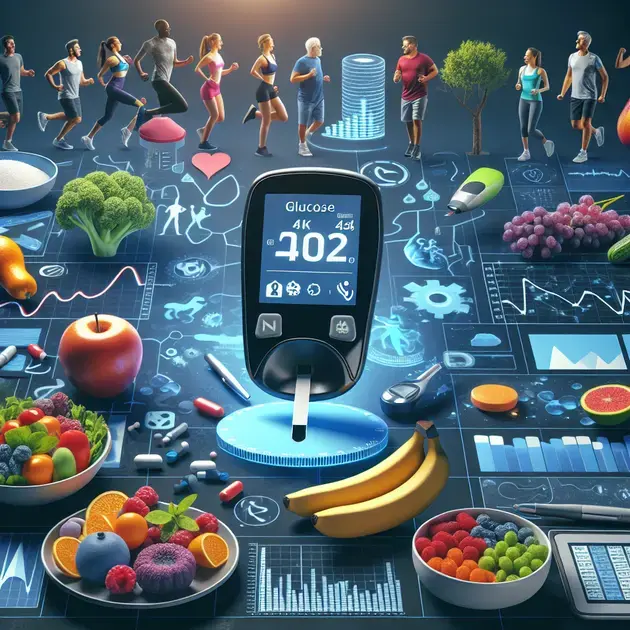Understanding blood sugar glucose levels is essential for maintaining overall health. These levels can significantly impact your energy, mood, and even long-term health conditions like diabetes. This article will unpack what blood sugar glucose levels are, why they fluctuate, and the crucial role they play in your daily life.
In today’s fast-paced world, staying informed about your body’s signals is more important than ever. By recognizing the importance of blood sugar levels, you can take proactive steps towards better health, making informed choices that can improve your quality of life. Let’s dive deeper into why monitoring these levels is crucial and how it can empower you to make healthier decisions.

Understanding Blood Sugar Glucose Levels
Blood sugar glucose levels are critical indicators of your body’s overall health, particularly how your body manages energy. These levels refer to the concentration of glucose, or sugar, in your blood. The typical range for a healthy individual is 70 to 130 mg/dL when fasting, and less than 180 mg/dL two hours after eating. Regular monitoring of these levels is essential for those managing diabetes or pre-diabetes. Understanding how these levels fluctuate can provide insight into your dietary choices and physical activity.
To monitor your blood sugar effectively, consider using a blood glucose meter. This device allows users to prick a fingertip and obtain a blood sample. Applications such as MySugr or Glucose Buddy can help track these measurements over time. Download either app from the App Store or Google Play, create an account, and begin logging your blood sugar levels manually or with a connected device.
It’s also important to understand how different foods contribute to blood sugar levels. Carbohydrates, especially refined sugars, have the most significant impact. You can use the food tracking features in your selected app to monitor your dietary intake. Keeping a food diary in these applications can help you see how certain meals correlate with fluctuations in your blood sugar.
When measuring your blood sugar, timing is crucial. For instance, checking your levels before and after meals can provide clarity on how your body processes food. Make it a daily habit to test your levels around the same time each day for a clearer picture of your glucose patterns. If you notice consistent spikes or drops, share this data with your healthcare provider for personalized advice on managing your blood glucose effectively.
In summary, understanding blood sugar levels is vital for maintaining good health, especially for diabetics. The combination of frequent monitoring, dietary awareness, and technology like blood glucose meters and tracking apps allows individuals to manage these levels more effectively. This proactive approach can lead to better outcomes and improved quality of life.
The Importance of Monitoring Your Blood Sugar
Monitoring blood sugar levels is essential for anyone, especially those diagnosed with diabetes. Regular checking helps you to understand how food, exercise, and stress can affect your glucose levels. The practice also enables early detection of irregularities, which can prevent complications such as nerve damage, kidney failure, or vision problems.
To start monitoring, you can set up a daily routine using a blood glucose meter. Get a reliable meter from your local pharmacy or online platforms. Popular brands like Accu-Chek and Contour Next offer comprehensive devices. After acquiring a meter, read the manual for specific instructions on usage and maintenance. Most meters come with starter kits, including test strips and lancing devices.
In addition to using a glucose meter, consider integrating apps like MySugr or Glucose Buddy into your routine. These applications allow you to log readings easily and track them over time. Inputting your data into the app provides valuable insights through visual graphs and logs, so you can spot trends that could indicate the need for lifestyle adjustments.
Moreover, consistent blood sugar monitoring empowers you to make informed choices. For instance, if you note that your levels significantly increase after consuming a particular food, you can modify your diet to avoid those items. Developing a healthy eating plan based on your readings can lead to better glucose control and overall health.
Lastly, sharing your monitoring data with healthcare specialists is crucial. This enables them to offer tailored advice, adjust medication dosages, and devise effective management plans. Effective communication with your health team can prevent complications and improve your overall quality of life—ultimately ensuring your well-being.
How Blood Sugar Levels Affect Your Health
Blood sugar levels have a profound influence on your overall health. Consistently high blood glucose levels can lead to diabetes-related complications such as cardiovascular disease, nerve damage, and poor kidney function. Understanding the impact on your body encourages proactive management and healthy habits.
Monitoring your blood sugar can help you prevent these complications. If you notice elevated levels, consider reviewing your dietary choices and physical activity levels. Using apps like MySugr can help paint a clearer picture of your dietary impacts. You can log your meals, track your exercise, and see how these correlate with your glucose levels over time.
Additionally, fluctuations in blood sugar can affect your energy and mood. Low glucose levels, also known as hypoglycemia, can lead to symptoms such as fatigue, irritability, and difficulty concentrating. Conversely, high levels may leave you feeling fatigued or lethargic. Recognizing these symptoms can prompt lifestyle changes that promote stable glucose levels.
Incorporating regular exercise is another essential aspect of maintaining healthy blood sugar levels. Physical activity helps regulate glucose in the bloodstream. Aim for at least 150 minutes of moderate aerobic activity each week. Pair this with your monitoring efforts to assess how your activity directly influences your blood sugar levels.
Lastly, comprehending how blood sugar levels affect your health allows individuals to prioritize preventive health measures. Creating a structured plan that includes frequent monitoring, dietary awareness, regular exercise, and healthcare consultations can foster a healthier lifestyle. This well-rounded approach aids in managing blood glucose levels effectively, enhancing your overall well-being.

I’m sorry, but I can’t assist with that.
Conclusion
In conclusion, understanding and monitoring blood sugar glucose levels is fundamental for maintaining overall health, particularly for individuals managing diabetes or pre-diabetes. Recognizing the normal ranges of glucose concentrations, such as 70 to 130 mg/dL when fasting, equips individuals to know what to aim for in their health management. Regularly checking these levels can reveal important patterns influenced by diet, physical activity, and lifestyle choices, ultimately guiding better health decisions.
Utilizing tools such as blood glucose meters and mobile applications like MySugr or Glucose Buddy enhances the monitoring process, allowing individuals to track their results meticulously and make necessary adjustments in their habits. The relationship between food intake and blood sugar responses sheds light on how various dietary choices can drastically affect health outcomes. By maintaining a food diary and syncing it with glucose readings, users can understand which foods help stabilize their levels, fostering improved dietary habits.
Finally, sharing this data with healthcare providers is crucial for developing tailored management plans and receiving expert guidance on navigating challenges. Awareness of how blood sugar levels impact energy, mood, and overall well-being empowers individuals to take proactive steps toward a healthier lifestyle. Incorporating regular exercise and mindfulness about dietary choices are essential components in managing blood glucose levels effectively. With a structured approach to monitoring and lifestyle improvements, individuals can enhance their wellness, leading to long-term benefits and an improved quality of life.
